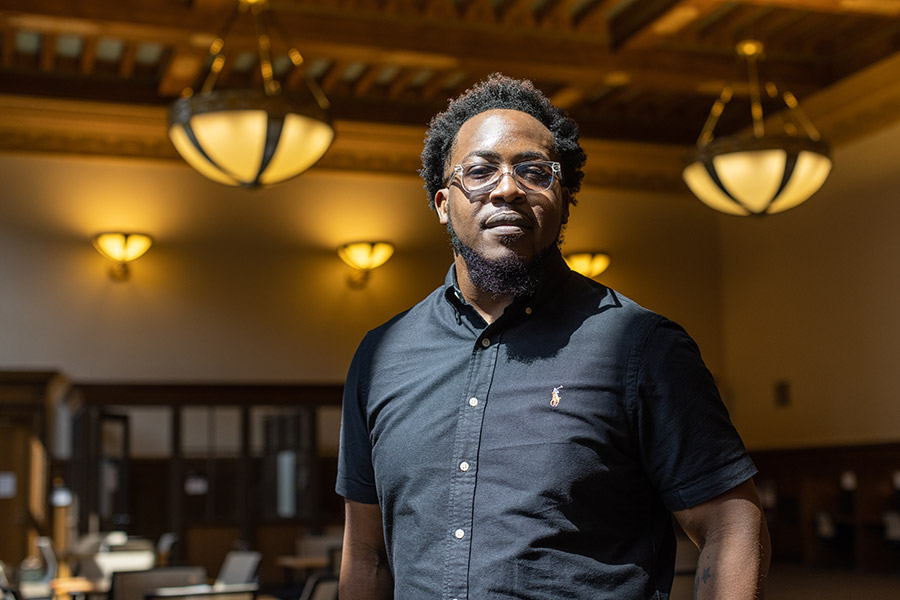Commit
Using “commit” emphasizes a pledge to prioritize antiracist efforts in making SPH a more welcome, equitable, and just organization.
Why do you think some U.S. states, cities, and counties have recently declared racism a public health emergency? What’s the importance of those declarations?

“I think that these entities have done this, because they cannot ignore racism anymore. Those who have been victims of racism are even more vocal than in the past about fighting and pushing for what they want and need to feel like full Americans. I just feel like racism can no longer be ignored or excused away.
Some of this attention to racism is rooted in our ability to learn and see more through social media and the internet. We have much more access to view what’s happening across our country and world as opposed to what’s just happening in the microcosm around us. I think that has inspired and influenced cities, states, and governments to recognize what is going on and to say or do something.
These declarations force us to talk about racism in more critical and direct ways, especially for those who might not be victims of racism. And I think that is the benefit of racism being declared a public health emergency.”
What do you see as your role in committing to antiracism?
“Continuing to fight for equality and equity.
And, the reality is that I live this life as a Black man, and I’ve constantly felt as if America sees Black people as always going through life with this sense of sadness, pain, and struggle. So, I’ve decided that it’s important for me to live a joyful life, to show that Black joy does exist, and to help people of color and other marginalized folk realize that even though we face issues and pressure from society, that does not mean that we don’t deserve joy and happiness, and that we can create those things ourselves. For me, it’s about serving as an example that Black joy is a real thing and that it is attainable.”
Challenge
We are “challenged” to accept that racism exists and to “challenge” it when we see it.
What are some ideas you have about how to stand up to racism?
“As individuals, we have to call out prejudice and racism when we see it.
On a larger scale, we have to attack policy and procedure. I say ‘attack’ because we have to go at it with a lot of energy and we have to be in depth about the conversations we’re having around the policies and procedures we implement. When we’re doing something that is new or unique we need to ask tough questions such as: Who are we serving? Who is not at the table? Who is not being included in this conversation? Who might not have access to reach, achieve, or do whatever it is we are developing because that is how we continue to move towards being antiracist.”
What challenges do we face in prioritizing antiracist efforts?
“White supremacy. And I want to be clear that by saying ‘white supremacy,’ I do not mean white people. White supremacy as an idea or concept exists in so much more than an individual, group, or identity. It’s ingrained in so many things, such as our government, our justice system, our school, and higher education. I think white supremacy is the biggest challenge because it has been allowed to permeate for so long, and we’re trying to undo hundreds of years of oppression.”
Change
We have to be willing to “change” and shift our beliefs, attitudes, and actions toward equity and justice.
What is your vision for an antiracist school of public health?
“I believe that an antiracist School of Public Health will be a place where we can actively and intentionally have justice-centered and antiracist conversations and folks will stay present in those conversations.
I want to see the work that we’re doing, the research we’re putting out, the centers we’re creating — all of that — really being rooted in and geared toward inclusivity and equity.”
How will you need to shift your own beliefs, attitudes, or actions toward equity and justice?
“I still sometimes forget that conversations about racism are often had in spaces that leave some people out. For example, I had the privilege of getting a college education and so I understand the world through that lens. I need to constantly remind myself that there are so many people who don’t have that privilege, and ensure that we are engaging in the conversation in a way where everyone can participate.
I wrote a poem that is rooted in the idea that part of what happens when folks are kept out of spaces like higher education, is that they are then deemed as ‘less than.’ It’s meant to empower those who have not been given access to these spaces, and acknowledge that they are still beautiful and have a lot to contribute to this world even though their journey is different. It’s called, “What They Do With Walls.”
What They Do With Walls
We hide our upbringing in pronunciation of words too pretty to paint our walls with
We are trying to paint our walls
They need to feel
that perfect
Just ain’t that pretty
See our colors
In our journeys
There are bent spinal cords
Carrying weight of broken backs
Pretty
Like college graduate
Like dope dealer
Like statistic
And data
Collection
Plate at church
Like hope
Bright colors
And a few pale hues
Pretty
There will be holes in our walls
Just painfully deep
To display our plaques
Our diplomas
Understanding that education
Will forever unlock
The chains that bind our thoughts
Will forever unlock
Chains
That bind
Thought
Because we think in a language
Too ugly to paint your walls with
Prison numbers
And first semester freshmen
Graduates
And victims
Of a place where they couldn’t pronounce the words
They are just words
But heavy enough
To keep angels
Locked to the ground
Face down
And dirty
Pictures mama would never paint her walls with
There is no one way to say something
So say something
In whatever language you form thoughts with
Because whoever doesn’t understand you
Doesn’t deserve to see your walls
Doesn’t deserve to see what you keep most close
They’ll just call the paint
colored
wrong”
“Building Equity, Driving Justice: Commit | Challenge | Change” — ties all communications related to the SPH Strategic Plan for Antiracism together under one look and feel. The theme showcases our guiding principles, and it motivates and inspires. "Agents for Change" profiles support this theme and all interview questions are related to the action words, Commit, Challenge, Change, as described above.
Submit an idea for this profile series — either your own story, or one that inspires you from another SPH individual or group.

